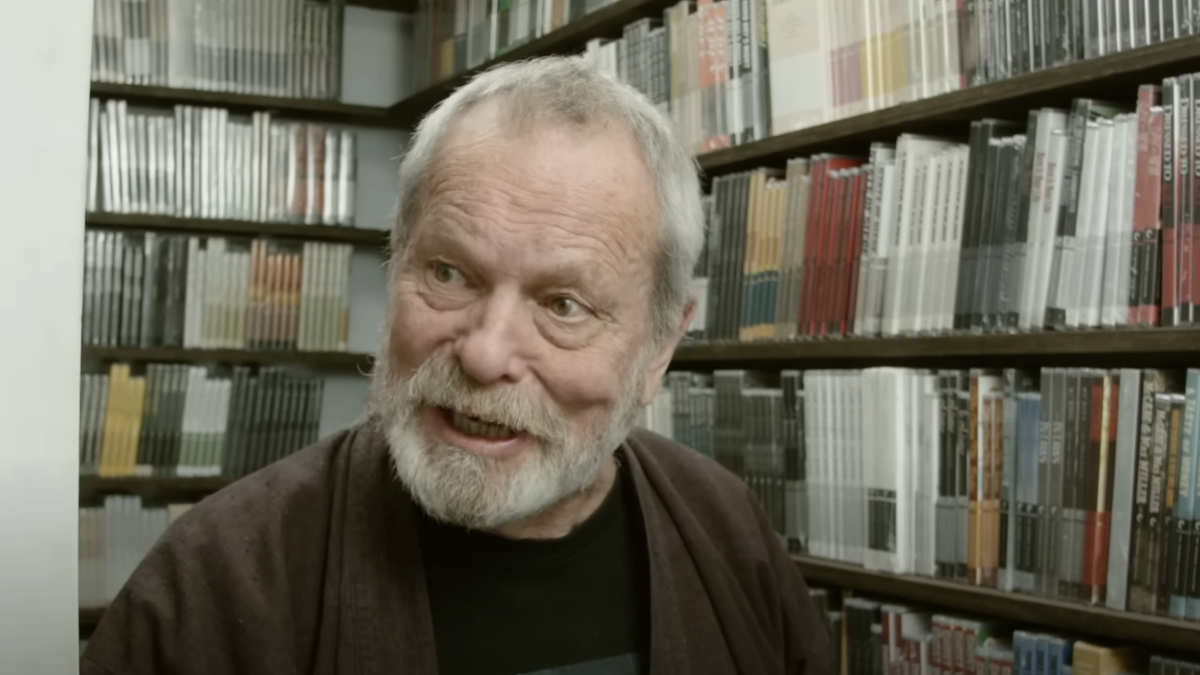Interview: Terry Gilliam

Whatever it is you think is going wrong with your pet project or however difficult you think the circumstances are, believe that Terry Gilliam has been through worse. The filmmaker is as famous for his wild fantasies like Brazil and The Adventures of Baron von Muchhausen as the trying circumstances that it took to make them, and his new film The Imaginarium of Dr. Parnassus is no exception. The fantasy about a traveling sideshow and a magical mirror that makes peoples imaginations come true was humming along in production until January 22, 2008, when star Heath Ledger died of an accidental overdose in New York City.
Gilliam considered scrapping the project entirely, but was encouraged by his cast and crew to soldier on, and eventually he recruited Jude Law, Johnny Depp and Colin Farrell to step in for Ledger in scenes behind the magic mirror. He now says he considered giving Ledger a co-director credit, given that his death so shaped the direction of the film.
Whether it's from his Monty Python days or a result of the trials and tribulations of his directing career, Gilliam has a wry and very dark sense of humor, cracking wise about fights he had with Ledger in his head while putting the film together and claiming that he wants all the credit for South Park. The below interview with him is well worth a read. The Imaginarium of Dr. Parnassus opens in limited release on Christmas Day.

How pleased are you to finally get this movie out there?
I've been doing press for three or four months now, and at a certain point, you just want to stop. We finished the film at the beginning of the year, and it was a long wait. And of course everything's last-minute panic. We had all this time to prepare things properly, and once again, it's panic time. That;s the way it works. I've known since March or February how well it plays. When I'm cutting a movie I'm showing it to people all the time. The youngest who's seen it is a 7-year-old, and the oldest is probably me, and it plays right across the board, which is a concept that distributors find it difficult to deal with. They forget Time Bandits was exactly the same thing.
On a movie like this you could tinker for months. How do you know when you're done?
Until I get bored. I've had enough of this thing, I want it out of my life! And when the money runs out, that's the other advantage. There's things I would still fiddle, but they're so minor that they're not worth fiddling with. You just know, that's as good as we can make it. People believe there might be a perfect film out there. I've never seen a perfect film in my life. Films are what they are. We were in a strange situation on this because we were way behind on the effects. We got trapped into a lot of schedules. I kind of like that, because it focuses you.
CINEMABLEND NEWSLETTER
Your Daily Blend of Entertainment News
How do advances in visual technology affect your work? I remember you doing perfectly good work with cut paper.
This other stuff we're doing here is very much in the same aesthetic, except it's 3D. It's 3D becaue we've got a world that has layers. I still use models when necessary. It's just mixing these various techniques. I've had my own effects company since, we started right after Holy Grail. I know how to do all of it. I have the advantage of my company because I"ll be there every day, sitting over the guy's shoulder. Sometimes I want to do it myself and cut out the piece of paper and wiggle it around.
How did your vision for the film change when Heath Ledger died?
It didn't change, basically, I just got these three other guys in. There's a scene between Anton and Jude-- that used to be Tony's trial, and it used to be in the wagon with all hth other. By putting it on the other side of the mirror, it's a better scene. It worked out better. At one point I was just going to say it was co-directed by Heath, because he was creating these situations, where there were only a few solutions. As far as Johnny, Colin and Jude taking over, that was inherent in what we had. It's already stated that two people go through the mirror, one imagination may be stronger than the other. It's entirely possible that the middle-aged shopping lady may be dreaming of Johnny Depp and not Heath Ledger.
What I can't tell, and will never know, is how the film would differ if it were Heath carrying the character all the way to his death. It might have been a stronger film. This way it might be a more entertaining film, it's certainly more surprising, because you don't know who you're going to see next. It was important to me not to change anything. That's the advantage of not being a studio film. How many studios would have let me introduce Heath's character as we do in the film? I said, we're not changing anything. Christopher Plummer didn't want to say the line when he's talking about stories-- "It could be a comedy, a romance, a tale of unforeseen death." He didn't want to say it, it was after Heath died. I said, you have to say it. It's the film Heath and I were making.
Are there any cut scenes with Heath that we'll see on the DVD?
It's all there. Nothing is thrown away, every bit is in there. For him to die when he did, it's like, how could you do it so tidily-- I don't know what other word to use. He didn't destroy the film. He somehow got all the important work of his done and then died. It's still a very strange experience that I haven't completely sorted out in my head.

Is letting the film go in a sense letting Heath go? You've been staring at him on a screen in an editing room a year after he died.
It's a very good way of grieving. You're having a dialogue with a man who is no longer around. By the end of it, it's done. And then when you start doing interviews and have to relive the whole thing. I'm just numb at this point. The loss is still a shock, and it's partly because it shouldn't happen. This guy with that kind of potential, that extraordinary talent as a human being, to suddenly not be there... this is not right. But the world has never been right, so why should it change now.
Did you have discussion with the other three actors about how to play this character? They seem to get the essence of what Heath was doing.
That was why they had to be close friends of Heath. I remember Colin at one point said he felt like he was channeling Heath. There was no time to rehearse. I had given them all a DVD of a few bits we had cut together, so they kind of saw what he was doing, and off they went. We had Johnny for one day and three and a half hours, that's it.
It was a very unnerving time, because none of us knew if it was going to work or not. That's why you start believing in the movie gods. People say it may be a better movie for this. I can't quite deal with that, because we don't know what the movie would have been like. it might have been a far more dramatic or powerful movie, with Tony getting his comeuppance with Heath, and seeing Heath turn into the monster that Colin becomes.
Where did your fascination with time travel and alternate realities come from?
It comes from reality. Isn't that what we live in? I was in London one minute, and suddenly I'm in New York. When Concorde used to fly, I'd arrive in New York before the time I left London. It's not so much time travel as being able to throw yourself into different time mentalities. If you want to you can run out to Africa and live with the bushmen and live in Neolithic society. It's a mindset. I just want to encourage people to invent their own worlds. My films are really just studies on this borderline between realty and fantasy, how each influences the other. I just like playing in that mess.

There's always a twisted and dark sense of humor in anything you do. Were you always this way?
I've always had a dark side, because that's what the world is. It's both light and dark, it's beautiful and horrible, and I hate missing out on any part of it. The way I think you get through it is by having a sense of humor. I don't know how else you deal with death and destruction and the horrible stuff out there. It's always been with me, my sense of humor. That's the great thing that came out of Python, is you can be both very British and very silly, very intelligent and very stupid, all at the same time. I always divided the world between those who giggled and those that didn't, and I think I was always one of those guys in the back of the class at school that was giggling. Not that I didn't like what I was hearing, I just found it silly. That will never stop. I think it's the only way I've gotten through most of the shit I've been through, because I can find it funny. For example, Heath and what has happened on Parnassus, I say: A warning to all actors. You don't show up for work, and there's three A-list actors ready to take over your part. People say, ooh, how can you say that about Heath? He's my friend, that's how I can say it. And he would have laughed as well.
Humor to me is even more important now, because everyone is so frightened, everyone is so timid about saying the wrong thing. What's wrong with offending people? My whole life has been sticks and stones can break my bones, but words can never hurt me. People have become so timid, and you're closing the world in. That's what I loved about what we were doing with Python
What does it mean to you that you've had such an influence on other comedians?
You're part of a continuum, part of a long continuum. Think of all the comedians who influenced us. I'm glad that we were able to pass on certain kind of humor that others have picked up. I never thought we were that original. It's all there, you can trace it. We just are in the middle of what influenced us. I want to take all the credit for South Park.
Staff Writer at CinemaBlend
Most Popular






